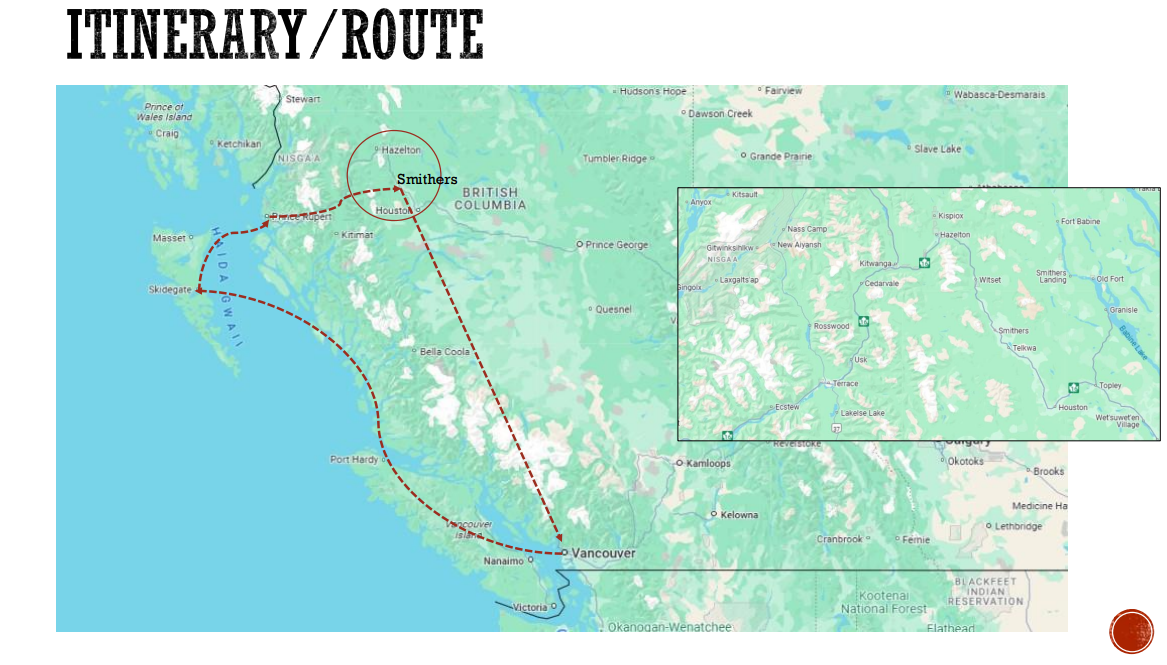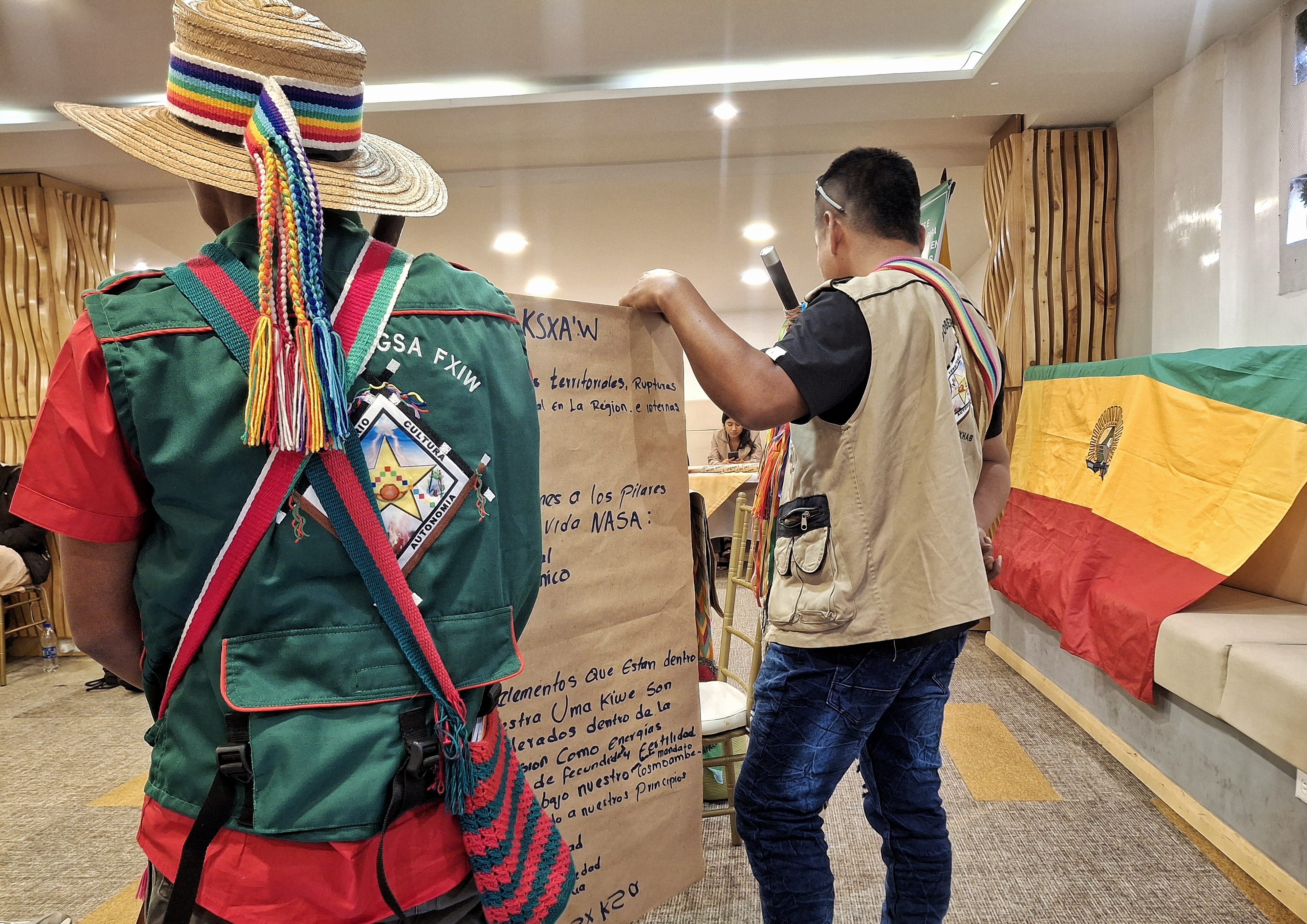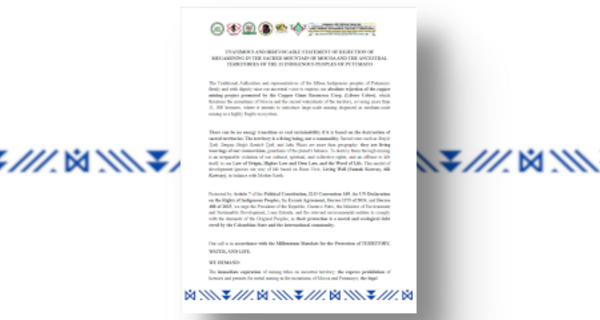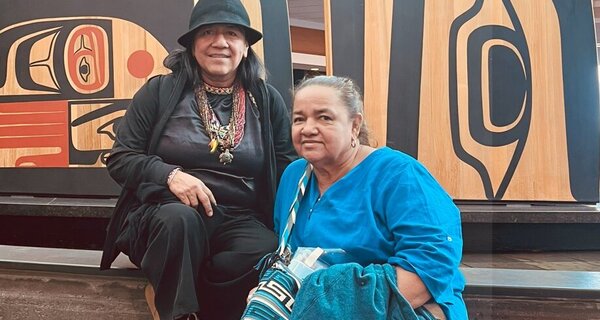
Standing together against imposed extractive economies
Indigenous peoples and peasant communities in Colombia and First Nations in Canada exchange strategies to defend territories of life
At the end of June 2025 women territorial defenders from the Colombian Amazon travelled north on a 10-day exchange tour to visit the territories of four First Nations in Turtle Island (Canada) to learn how indigenous peoples there are affected by extractive economies; and to share their own experiences and concerns about the impacts of mining, oil and gas projects affecting their territories in the Putumayo region of Colombia, much of it driven by Canadian extractive companies and international investors.
Towards the end of the tour a group of Colombian indigenous and peasant territorial defenders also gathered together in Bogotá for 3.5 days to exchange strategies on accessing justice and addressing challenges facing leaders and communities that stand up to imposed extractives intervention and harmful mineral and hydrocarbon exploration and exploitation, which is trampling on their rights, dividing their communities and causing threats and harms to the physical and spiritual integrity in their territories in the Amazon, Andrean uplands and in the Magdalena River Valley.
At the end of both actions, First Nation leaders in Canada and leaders and land defenders gathered in Colombia held a virtual dialogue to exchange perspectives on common struggles, expressing solidarity between peoples, and reiterating calls for full respect to their right to self-determination, adherence to the core minimum standard of free, prior, and informed consent and cessation of global finance for extractive projects imposed on peoples’ territories.
Weaving alliances in defence of life, territories and cultural heritage
In Canada, Colombian women territorial defenders met with Indigenous Peoples in so-called British Columbia to exchange experiences on common struggles and to build alliances. Between June 18 and 28 they toured the region, meeting with Haida, Wet'suwet'en, Gitanyow and Gitxsan Hereditary Chiefs, land defenders, knowledge keepers and youth, and visiting sites of resistance. The Colombian Amazonian leaders learned how, as in Colombia, indigenous ancestral lands in Turtle Island (Canada) are facing immense pressure from imposed extractive projects, that are wreaking social and environmental havoc and fanning conflict within and among communities. The Coastal GasLink pipeline project is nearly fully operational, and provincial and federal governments—with the intention of diversifying market access in the context of US threats to Canada's sovereignty—have recently approved the Prince Rupert Gas Transmission (PRGT) pipeline.

The tour took place at a pivotal time when the Governments of Canada and British Columbia had just passed legislation to fast-track extractivist projects in "the national interest” claiming such measures are justified in order to access "critical minerals" to meet international demand for a green energy transition. This expedited legislation violates Indigenous Peoples rights to free, prior and informed consent, as well as other fundamental rights that are guaranteed by provincial law through the Declaration of the Rights of Indigenous Peoples Act (DRIPA) and at the federal level by the United Nations Declaration of Indigenous Peoples Rights Act (UNDRIPA). Information was shared on how these and other large-scale extractive projects threaten the ancestral territories of the Gitxsan, Gitanyow and Wet'suwet'en Peoples, with impacts also on Haida lands and seas, jeopardising their physical and cultural survival, their territories and their future generations.
The visiting woman leaders exchanged information with their First Nation hosts about threats to the lives and security of indigenous and community leaders in Colombia who challenge the expansion of the extractive frontier; and about key social actions being organised by indigenous and popular movements to oppose imposed extractive projects led by Canadian companies and financiers. Information shared included a recent unanimous and irrevocable public statement rejecting a copper mining project promoted by BC-headquartered Canadian company Copper Giant Resources Corp. (formerly Libero Copper), which threatens the sacred mountains of Mocoa and risks harm to the watersheds of the ancestral Amazonian territories of 15 Indigenous peoples of the Putumayo.
Aside from exchanges on territorial threats, leaders showcased how they are revitalizing their languages, spirituality, Indigenous law and governance models. The role of women and youth in decision-making and territorial defense was highlighted. The intercultural dialogues and conversations throughout the tour in Canada involved expressions of connection, mutual understanding and solidarity across nations and between peoples.
What happens in the South, you feel in the North. Because we are only one people. And we are also women of the turtle.
— Waira Nina, territorial defender from the ancestral territory of the Inga People in Colombia
The Earth is the Mother who gives life. The Earth does not belong to us; we belong to the Earth…Extraction isn't only associated with the damage to Amazonia. We in all countries are related; we are all connected.
— Jani Silva, territorial defender from the Zona de Reserva Campesina Perla Amazónica
If you're not invited to the table, then there's a good chance you're on the menu
— Gitxsan Hereditary Chief Jesse Stoeppler, commenting on national fast-track legislation Bill C-5 passed without Indigenous consent
Territorial defenders in Colombia share strategies and solutions

Between June 25-27, representatives from Putumayo, Caquetá, Caldas, Sucre, and Antioquia shared their experiences and reflected on how to challenge mega mining, extractive projects and international investments affecting their territories. Participants included leaders of the Nasa, Inga, Kamëntsá, Kofán, Siona, Zenú, Uitoto, Murui, Embera Chamí, and Macuna Indigenous Peoples, along with representatives of the Perla Amazónica Peasant Reserve Zone and delegates from the Andean-Amazonian Guardians Council. During information sharing sessions, participants learned that nearly half of the world's publicly traded mining companies are Canadian; while flows of international investment from Canada and elsewhere are driving the expansion of extractive projects and their related infrastructure in Colombia. Leaders and representatives highlighted serious concerns about threats to life and current and potential harms to their territories caused by the extractive sector.
Discussions involved the sharing of strategies for coordination and communication, as well as collective actions to confront threats from abusive companies, protect ancestral heritage, and safeguard Mother Earth now and in the future for the benefit of (all) her peoples and biodiversity at this critical moment for humanity.
“The struggle continues. Our ancestors have resisted more than 536 years. We cannot step back because we face some obstacle or because we are afraid that they (the companies) will criminalise us. Because that’s what they say: !No! (they say) go away or we will take you to court. … But that’s a sign that really fighting for life and collective rights, for the common good, is worth it. That in Colombia the interest of an individual company cannot prevail over the collective rights of peoples and communities”
— Territorial defender and leader in Bogotá meeting, 25 June
Indigenous and peasant leaders and participants denounced the profound impacts that Canadian mining and oil and gas companies have had on their lives, cultures and territories, including harms to forests and fragile watersheds in the Amazon region. Participants exchanged information on the controversial large-scale mining project proposed by Copper Giant Resources Corp. (formerly Libero Copper) which would extract copper and molybdenum in the municipality of Mocoa, Putumayo, with a direct footprint covering 7800 hectares and proposed operation affecting the ancestral Indigenous territories of the Inga, Nasa and Kamëntsá Peoples and the Upper Mocoa River Basin Protected Forest Reserve. The Colombian courts have ruled that this company has operated without respecting the right to free, prior and informed consent (FPIC).
The Bogotá event also included discussions and collective analysis of the concessions and operations of Gran Tierra Energy, a fossil fuel company headquartered in Calgary, Canada which earned 93% of its income from its extractive investments in Colombia in 2024. This company owns 50% of the PUT8 Block, which overlaps with 81% of the Perla Amazónica Campesino Reserve Zone, a collective peasant territory. Established 25 years ago, the Zona de Reserva Campesina Perla Amazonica, orients its commitment to conservation, species monitoring, life projects and the recovery of biological corridors with emphasis on the Amazonian territory through its motto: "for the protection of life, territory and biodiversity". The Nasa and Inga Indigenous Peoples and others have reported that, despite court rulings recognising state and company violations of the right to free, prior and informed consent and the right to a healthy environment, the company has continued its operations. It has also been implicated in at least 26 oil spills. Environmental licences for these projects remain in place even though the Colombian state has committed to protect biodiversity and uphold the rights of indigenous peoples and peasant communities.
Virtual dialogue
On 27 June participants in Bogota (Colombia) and First Nation leaders met virtually, learning about their shared struggles, hopes and dreams, and forging alliances. The virtual dialogue and the tour in Canada involved expressions of connection, mutual understanding and solidarity across nations and between peoples. The virtual exchange ended with invitations to First Nations to visit Colombia and for Colombian leaders to come again to First Nation territories in Canada with hopes for ongoing exchanges of resistance strategies, alliance building and sharing on solutions grounded in respect for rights and alternative economies.
Additional information and updates
- Declarations:
- Media coverage:
Nacla, July 17, 2025, Indigenous Communities in Putumayo Mount Resistance against Canadian Oil
Peace Brigades International-Canada, June 26, 2025, The struggle to live in peace; defenders of territories in Colombia and Canada meet to renew and strengthen relationships of solidarity
Pirate Wire Services, Jun 22, 2025, Indigenous people in Colombia’s rainforests mount new resistance against an old foe: Canadian oil companies
Solidarity organisations, allies and networks: The exchange and sharing actions in Canada and Colombia undertaken in June 2025 were accompanied by the Forest Peoples Programme, PBI Canada; PBI Colombia, and the Inter-ecclesiastical Peace and Justice Commission (CIJP). Additional support and accompaniment for the Canadian exchange tour was provided by the Public Service Alliance of Canada (PSAC) Social Justice Fund; Amnesty International-Canada, Mining Watch Canada and the Zero Tolerance Initiative (ZTI).
Overview
- Resource Type:
- News
- Publication date:
- 1 Agustus 2025
- Region:
- Colombia Canada
- Programmes:
- Territorial Governance Culture and Knowledge Supply Chains and Trade Global Finance



